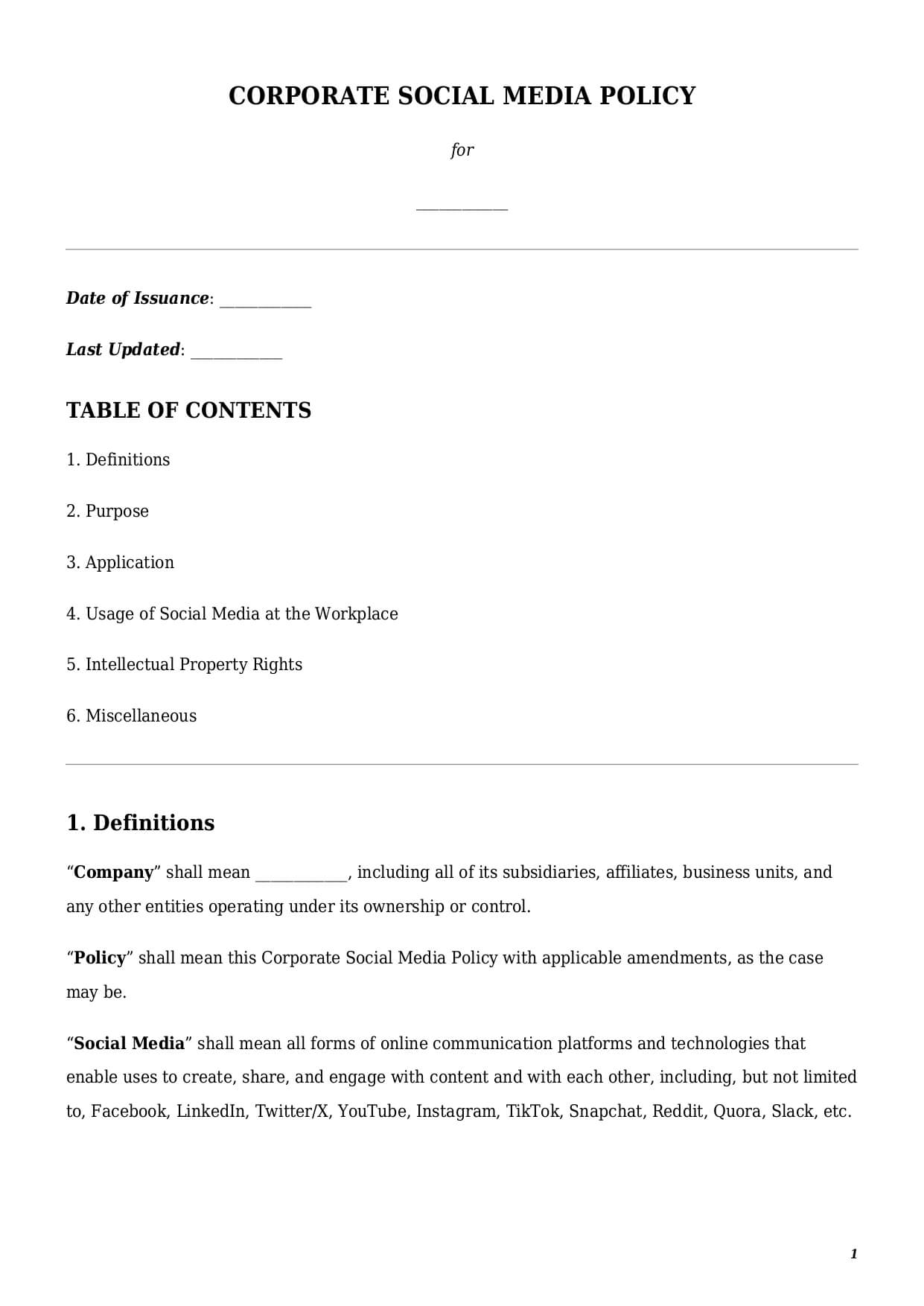Corporate Social Media Policy
Reviews


What is a social media policy?
A social media policy is a formally documented set of rules and guidelines that defines how employees may interact with and represent the company across online platforms. The template helps to outline the solid legal framework for:
- policy application by employees;
- policy duration and updates;
- set of prohibited actions for employees; and
- protection of a company’s confidential information.
How to draft a sample social media policy?
Drafting a sample social media policy from scratch could be a daunting task for anyone. No worries, we’ve got you covered here. Below you can find a short checklist of the most important things a sound social media policy should have.
Scope of Application
From the template’s title it is evident that the present social media policy for employees shall apply only towards those who work in a company. The term “work in a company” is not precise, however, and therefore cannot properly define the exact list of individuals who shall comply with it.
A good company social media policy shall explicitly cover the following categories of employees:
- full-time and part-time;
- those who are on vacation or any other type of leave;
- interns and trainees;
- contractors or third parties who have access to a company’s social media accounts.
Another important aspect a social media policy template shall address is the definition of social media. In other words, the policy should define the list of platforms that are covered or shall be protected—e.g., Facebook, Twitter/X, Instagram, YouTube, etc.
Rules for Usage of Social Media
A good example of a company social media policy shall cover all actions employees shall avoid while performing their working duties. The most common prohibited actions are the following:
- post in full or partially any confidential or trade secret information related to a company, its activities, or its personnel.
- usage of a company’s brands, logos, or other corporate identities without prior authorization or not in accordance with agreed rules.
- harass, bully, or discriminate in any way within or outside working hours.
Using social media outside of work
A comprehensive social media policy template shall also define the framework for using social media outside of normal working hours. Therefore, the text of a policy should clearly outline the limitations below:
- Do not post on behalf of a company or organization from private accounts.
- Do not use personal accounts to perform, in full or partially, any work on behalf of the company or for the company.
- Do not post defamatory, offensive, or any harmful content from private accounts.
Well-drafted social media policy examples shall explicitly limit employees’ usage of their private social media accounts on employer’s equipment. Such equipment may include corporate laptops, tablets, mobile phones, or other gadgets.
Changing the Policy
Every corporate social media policy shall define how to inform employees about the policy’s changes. The company’s management may choose to communicate those changes in either of the following ways:
- sending a personal email to every employee (in that case an employee’s work email shall be used);
- publishing the new updates on a company’s intranet;
- publishing the new updates on a company’s official website;
- announcing changes during a meeting or training, etc.
It is vital to inform all employees on time about the adopted changes to make sure everyone can comply with the new rules and guidelines.
Signing the Policy
Neither federal nor state law defines the procedure of signing a social media policy. Since the policy is an internal corporate document, companies may establish their own rules.
If a company or entity chooses to sign this policy, in that case a company’s official representative shall do that. Such a representative could be the head of a legal department, the head of an HR department, the company’s CEO, etc. Before signing a policy, the parties have to check the company’s internal bylaws to find out who is authorized to sign policies on behalf of a company or entity.
How to customize a corporate policy at Faster Draft?
To personalize a corporate policy for your business, follow a few easy steps:
- Click the button “Create Document.”
- Answer simple questions in the questionnaire.
- Select a document’s title—social media policy PDF or Word.
- Make a payment.
- Download, e-sign, print, and use your customized corporate policy in minutes.
Table of content

Looking for something Different?
Start typing to find out our collection of legal documents and contract templates
